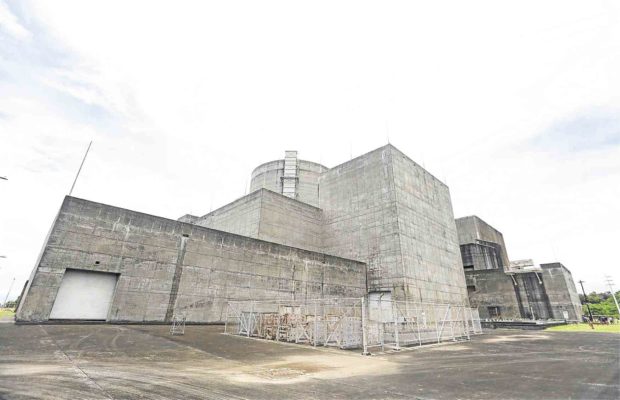Gatchalian cautions gov’t on entering into nuke energy deals

WHITE ELEPHANT The Bataan Nuclear Power Plant, built using a foreign loan has not produced a single watt of electricity after the government shut it down in 1986 due to safety and corruption issues. INQUIRER FILE PHOTO/LYN RILLON
MANILA, Philippines — The Philippine government should “take extra precautionary measures” in entering deals concerning nuclear power plants with foreign countries, Senator Sherwin Gatchalian said Monday.
The Philippines and Russia have agreed to explore the prospect of possible cooperation to construct nuclear power plants in the country after the Department of Energy entered into a memorandum of intent with Russia’s Rosatom State Nuclear Energy Corp. during President Rodrigo Duterte’s visit to Moscow last week.
READ: PH, Russia agree to explore possible construction of nuclear plants
Gatchalian, who chairs the Senate energy committee, said the country still lacks laws and the proper framework to regulate and ensure safeguards on nuclear energy.
“Dapat mag-ingat tayo and take extra precautionary measures in entering into nuclear power dahil, unang-una, kulang tayo sa mga batas na magpro-promote ng nuclear power dito sa bansa (We should be careful and take extra precautionary measures in entering into nuclear power because, first of all, we lack laws that would promote nuclear power in the country),” he told reporters in an interview.
Article continues after this advertisementHe said the country must also be ready for the risks of operating a nuclear power plant, especially the transport and disposal of nuclear waste.
Article continues after this advertisement“We should have laws for nuclear safety. We also need a law on how to transport and store nuclear wastes. So we have to be very cautious in moving forward. We still lack a framework,” he pointed out.
“Having said that, nuclear power also poses great risks. We should ensure that we have the capability (to operate nuclear power plants),” he added.
He noted that the 2011 Fukushima Daiichi nuclear plant meltdowns in Japan, which were caused by a magnitude 9.0 earthquake and tsunami, had displaced some 600,000 people.
Gatchalian, chair of the Senate energy committee, said the mix-use of renewable energy and traditional energy sources would be a better approach in addressing the country’s rising power demand.
He noted that even the President had raised his own reservations on the use of nuclear power.
“Without looking at the deal that they went into, we could start the studies on the feasibility, safety, and possibility of having nuclear (plants) in our country,” the senator said.
On Sunday, Duterte, upon arriving in the Philippines after his five-day official visit to Russia, said that the deal may not be constitutional after all.
“The Constitution would not like it. That is why I have to talk to the Cabinet. I cannot affirm or deny that because that’s part of the proposals,” he said.
Meanwhile, presidential spokesperson and chief legal counsel Salvador Panelo said nothing is final yet on the said nuclear power deal.
“They are discussing if it is feasible or not. Kumbaga pinag-uusapan pa lang ‘yan. Wala pang sigurado doon (It’s still being discussed. Nothing is certain there yet.),” he said during a Palace briefing on Monday.
READ: Nothing final on Philippines – Russia nuclear energy deal – Palace
/kga